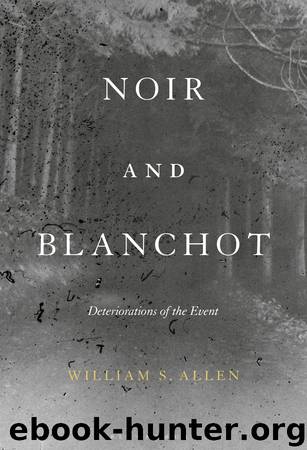Noir and Blanchot by William S. Allen;

Author:William S. Allen;
Language: eng
Format: epub
Publisher: Bloomsbury USA
X. The disaster
Philosophical discussion of the event, whether it is from such differing points of view as Heidegger, Deleuze or Badiou, is concerned with understanding the origin as a self-grounding, self-unfolding and self-concealing breach, which demonstrates that ontology is not given but occurs. Whether in art, love, science, politics or language, what is understood to be an event is the appearance of a world that is unforeseen and irreducible. A new set of terms and dimensions that is strictly irrational becomes manifest, as it lacks any substantiating reason other than itself, and incomprehensible, as it can only be thought on its own terms rather than through any pre-existing categories. Such thinking follows in the tradition of the modernist theology of the new, of the renovation of the world through its own reincarnation, a sudden and explosive transformation that generates its own language and followers. What is compelling about film noir, and is also apparent in Blanchot’s thought, is that this notion of reinvention is deteriorated beyond repair by the corrosive effect of contingency, which leads to a very different thought of change, of the accident and the disaster, of material contagion and breakdown. The inevitability that often appears in films noir or in Hitchcock’s films as the heavy hand of fate is no more of a reality than the apparently deterministic necessity of Hegel’s system of logic. In both cases it is contingency that takes on the appearance of necessity, which becomes necessity, as conditions that could be otherwise become a necessity through the movement of actuality, as Marcuse wrote in 1932:
The particular factual immediacy in which every actual initially exists and that is only a contingency over and against its possibilities, something that must be overcome [aufgehoben] – this contingency is the ground for the fact that the necessity in the movement of the actual is only ‘relative’, that it can never free itself from this contingency as its inception, its presupposition, but carries this within itself throughout its whole movement. Thus necessity is in itself profoundest contingency! ‘Real necessity is determinate necessity … The determinateness of necessity consists in its having its negation, contingency, within it. This is how it has shown itself to be’ … So if we want to define [bestimmt] the fully realized [vollendete] concrete being, the ‘absolute actuality’, we must include this contingency in its determination; actuality can only be ‘absolute’, and only as actuality be necessity, when it has also realized contingency as necessity, when necessity ‘determines itself out of itself into contingency’.15
Criminality provides an insight into the mechanisms of this movement by which contingency becomes necessity, and in which it exposes a movement of time that is not eventful but accidental, materially deteriorate. Such might be termed the recidivism of history, its permanent declination into a field of persistent loss and alienation, which is what is exposed through the absolute of literature.
The criminal path emphasizes the fact that the real possibilities inherent in any actual situation are contingent, and thus that this actuality is itself contingent, and that recognition of this contingency leads to disquiet.
Download
This site does not store any files on its server. We only index and link to content provided by other sites. Please contact the content providers to delete copyright contents if any and email us, we'll remove relevant links or contents immediately.
| African | Asian |
| Australian & Oceanian | Canadian |
| Caribbean & Latin American | European |
| Jewish | Middle Eastern |
| Russian | United States |
4 3 2 1: A Novel by Paul Auster(11764)
The handmaid's tale by Margaret Atwood(7424)
Giovanni's Room by James Baldwin(6782)
Asking the Right Questions: A Guide to Critical Thinking by M. Neil Browne & Stuart M. Keeley(5339)
Big Magic: Creative Living Beyond Fear by Elizabeth Gilbert(5328)
Ego Is the Enemy by Ryan Holiday(4922)
On Writing A Memoir of the Craft by Stephen King(4650)
The Body: A Guide for Occupants by Bill Bryson(4560)
Ken Follett - World without end by Ken Follett(4428)
Bluets by Maggie Nelson(4245)
Adulting by Kelly Williams Brown(4214)
Eat That Frog! by Brian Tracy(4133)
Guilty Pleasures by Laurell K Hamilton(4103)
White Noise - A Novel by Don DeLillo(3819)
The Poetry of Pablo Neruda by Pablo Neruda(3802)
Fingerprints of the Gods by Graham Hancock(3722)
Alive: The Story of the Andes Survivors by Piers Paul Read(3715)
The Book of Joy by Dalai Lama(3675)
The Bookshop by Penelope Fitzgerald(3609)
